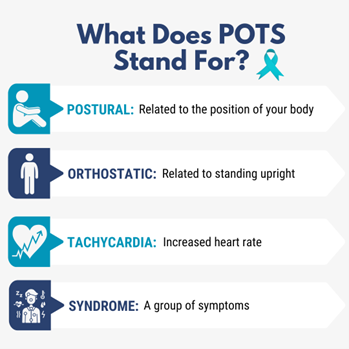October is Dysautonomia Awareness Month and today, October 25th, we recognize POTS Awareness Day.
Understanding Dysautonomia and POTS
Dysautonomia is an umbrella term for a group of conditions that result from dysfunction of the autonomic nervous system (ANS)—the part of the nervous system that controls involuntary bodily functions, such as heart rate, blood pressure, breathing, digestion, and temperature regulation. When the ANS malfunctions, these automatic processes become dysregulated, leading to a wide range of symptoms that can affect multiple organ systems.
Dysautonomia can be mild or severe, temporary or chronic, and in some cases, it can be disabling. The severity and symptoms vary depending on the specific type of dysautonomia a person has. While some forms are rare, others, like Postural Orthostatic Tachycardia Syndrome (POTS), are more common.
Types of Dysautonomia
There are several types of dysautonomia, each with distinct causes and symptoms. Some of the most recognized forms include:
- Postural Orthostatic Tachycardia Syndrome (POTS) – A common form of dysautonomia that affects blood circulation and is characterized by an abnormal increase in heart rate upon standing, often accompanied by dizziness, fatigue, brain fog, and exercise intolerance.
- Neurocardiogenic Syncope (NCS) – Also known as vasovagal syncope, this condition causes sudden fainting due to a drop in blood pressure and heart rate in response to triggers like standing for long periods, emotional distress, or pain.
- Multiple System Atrophy (MSA) – A rare but severe neurodegenerative disorder that affects the autonomic nervous system and movement, leading to progressive loss of function in several body systems.
- Pure Autonomic Failure (PAF) – A rare condition that primarily causes low blood pressure upon standing (orthostatic hypotension), leading to dizziness and fainting.
- Familial Dysautonomia (FD) – A genetic form of dysautonomia that primarily affects people of Ashkenazi Jewish descent. It causes a variety of symptoms, including difficulty regulating body temperature, blood pressure instability, and poor motor coordination.
- Autoimmune Autonomic Ganglionopathy (AAG) – A rare autoimmune disorder in which the body attacks the autonomic nervous system, leading to widespread autonomic dysfunction.

What is POTS?
Among the many forms of dysautonomia, Postural Orthostatic Tachycardia Syndrome (POTS) is one of the most prevalent and commonly diagnosed. It is a chronic disorder that affects the regulation of blood flow and volume, making it difficult for the body to adjust to postural changes like standing up.
POTS is classified as a form of orthostatic intolerance (OI), meaning the ANS struggles to maintain stable blood pressure and heart rate when transitioning from lying down to standing. It can develop on its own (primary POTS) or as a secondary condition to infections, autoimmune diseases, or other disorders that affect the ANS.
OMF's Research
POTS often intertwines with other complex chronic diseases like ME/CFS and Long COVID. That’s why we are dedicated to pioneering research and fostering a deeper understanding of these conditions through our studies, including:
- Linking brain blood flow, neuroinflammation, metabolism and hormones in ME, POTS and Long COVID, Melbourne ME/CFS Collaboration: This study explores the structural, neurovascular, and biochemical differences in the brains of people with ME/CFS, Long COVID, and POTS to understand the pathology of the diseases and identify potential treatment targets.
- Precision Medicine for Myalgic Encephalomyelitis Drug Discovery and Clinical Trials (REMEDIAL), Collaborative Center at Montreal: This project aims to identify the shared mechanisms of ME/CFS and POTS, which could lead to new treatment options.
- Blood Flow and Exercise in ME/CFS and Orthostatic Intolerance, Melbourne ME/CFS Collaboration: The study aims to investigate the effects of supine vs upright exercise on cerebral blood flow, blood pressure, heart rate, and the presence of autoimmune antibodies in ME/CFS patients with orthostatic intolerance, compared to controls, to understand the underlying mechanisms and differences in symptom severity and post-exertional malaise.
At Open Medicine Foundation, we are united with millions worldwide to amplify awareness of these often-overlooked conditions.